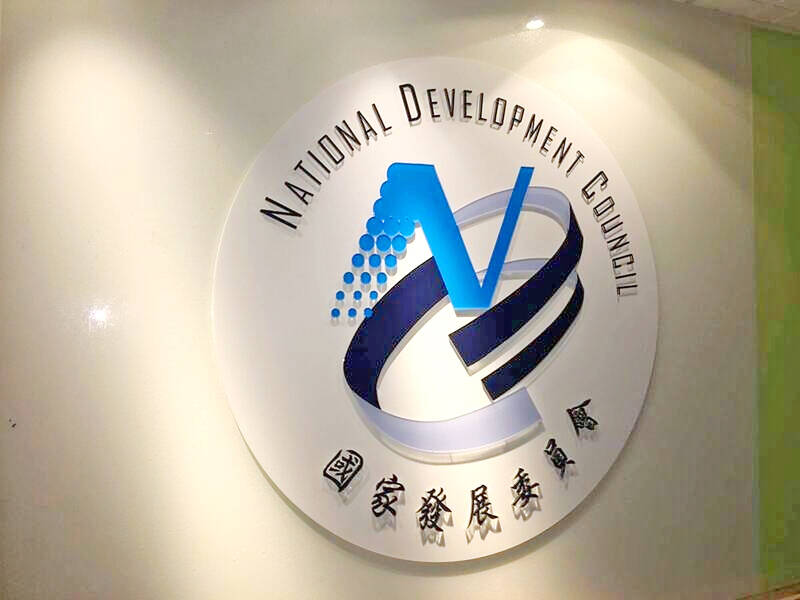Taiwan’s economy outperformed major regional rivals between 2019 and 2022, helped by the government’s introduction of policy measures to attract capital repatriation, improve infrastructure, assist strategic sectors and facilitate industrial upgrades, the National Development Council (NDC) said in a statement yesterday.
The council’s remarks came in response to the campaign office for Chinese Nationalist Party (KMT) presidential candidate and New Taipei City Mayor Hou You-yi (侯友宜), which held a news conference earlier criticizing the nation’s economy as “poor and lagging behind.”
In the statement, the council said Taiwan led the pack during the period by measure of GDP growth among the four Asian Tigers, namely Hong Kong, Singapore, South Korea and Taiwan. All four economies have been fueled by export-led growth and rapid industrialization since the 1960s.

Photo: Wu Hsin-tien, Taipei Times
In addition, the TAIEX last year put up a stronger showing than the Hong Kong bourse, which has been hit hard by capital outflows, the council said. By contrast, the local bourse reported massive capital inflows in November and last month, consistent with recovery expectations on the part of global funds for technology products, Taiwan Stock Exchange data showed.
Taiwan in 2022 became the world’s 21st-largest economy with annual per capita income surpassing US$30,000, making it the 10th-best performer among nations with a population of more than 21 million and the second-strongest judging by purchasing power parity, the council said.
The government lent support by rolling out the Invest Taiwan program that allowed local firms based in China to shift manufacturing facilities home with favorable investment terms to dodge the US-China trade disputes, it said.
Further, the government provided aid to the “five plus two” industries that help advance policy initiatives regarding an “Asian Silicon Valley,” biomedical technology, green energy, robotics, defense and aviation, innovative agriculture and a circular economy, the council said.
In addition, the government poured money into infrastructure projects to help narrow development gaps in the north, central and south of Taiwan, it said.
Taiwan also fared well during the COVID-19 pandemic as manufacturers maintained normal operations and supplied the world’s smartphones, tablets, wearables, TVs and cars, the council said.
Over the past eight years, Taiwan’s GDP growth averaged 3.1 percent, better than Singapore, South Korea and Hong Kong, it said.
The same period saw cumulated foreign investment amounting to NT$2.49 trillion (US$80.32 billion) with foreign direct investment in 2022 climbing to a 15-year high of US$13.3 billion, it added.
The income gaps between households are widening because family sizes have grown smaller, weighing on their overall income, as Taiwan’s population ages rapidly, the council said.
However, Taiwan’s Gini coefficient, a globally used measure of income inequality, was 0.277 in 2021, milder than 0.333 in South Korea, 0.386 in Singapore and 0.382 in China, it said.

CHIP RACE: Three years of overbroad export controls drove foreign competitors to pursue their own AI chips, and ‘cost US taxpayers billions of dollars,’ Nvidia said China has figured out the US strategy for allowing it to buy Nvidia Corp’s H200s and is rejecting the artificial intelligence (AI) chip in favor of domestically developed semiconductors, White House AI adviser David Sacks said, citing news reports. US President Donald Trump on Monday said that he would allow shipments of Nvidia’s H200 chips to China, part of an administration effort backed by Sacks to challenge Chinese tech champions such as Huawei Technologies Co (華為) by bringing US competition to their home market. On Friday, Sacks signaled that he was uncertain about whether that approach would work. “They’re rejecting our chips,” Sacks

Taiwan’s exports soared 56 percent year-on-year to an all-time high of US$64.05 billion last month, propelled by surging global demand for artificial intelligence (AI), high-performance computing and cloud service infrastructure, the Ministry of Finance said yesterday. Department of Statistics Director-General Beatrice Tsai (蔡美娜) called the figure an unexpected upside surprise, citing a wave of technology orders from overseas customers alongside the usual year-end shopping season for technology products. Growth is likely to remain strong this month, she said, projecting a 40 percent to 45 percent expansion on an annual basis. The outperformance could prompt the Directorate-General of Budget, Accounting and

NATIONAL SECURITY: Intel’s testing of ACM tools despite US government control ‘highlights egregious gaps in US technology protection policies,’ a former official said Chipmaker Intel Corp has tested chipmaking tools this year from a toolmaker with deep roots in China and two overseas units that were targeted by US sanctions, according to two sources with direct knowledge of the matter. Intel, which fended off calls for its CEO’s resignation from US President Donald Trump in August over his alleged ties to China, got the tools from ACM Research Inc, a Fremont, California-based producer of chipmaking equipment. Two of ACM’s units, based in Shanghai and South Korea, were among a number of firms barred last year from receiving US technology over claims they have

BARRIERS: Gudeng’s chairman said it was unlikely that the US could replicate Taiwan’s science parks in Arizona, given its strict immigration policies and cultural differences Gudeng Precision Industrial Co (家登), which supplies wafer pods to the world’s major semiconductor firms, yesterday said it is in no rush to set up production in the US due to high costs. The company supplies its customers through a warehouse in Arizona jointly operated by TSS Holdings Ltd (德鑫控股), a joint holding of Gudeng and 17 Taiwanese firms in the semiconductor supply chain, including specialty plastic compounds producer Nytex Composites Co (耐特) and automated material handling system supplier Symtek Automation Asia Co (迅得). While the company has long been exploring the feasibility of setting up production in the US to address